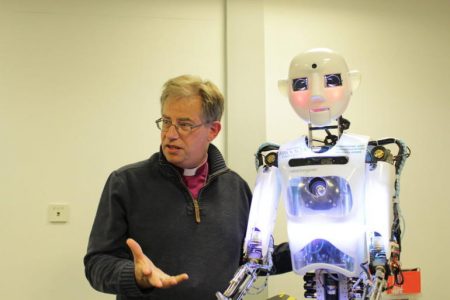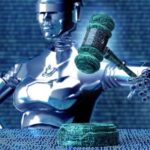March 6, 2018 – The Bishop of Oxford, Steven Croft, who sits on the House of Lords select committee on artificial intelligence (AI), and who is also an avid blogger about science, technology, and faith, in a speech given at an event focused on AI and robotics, pronounced a new 10 commandments for AI. Combining both moral and political arguments in his pronouncements I thought this would make interesting reading. Croft sees AI’s purpose as one that should better humankind and the planet, and that the technology’s purpose should focus on solving the big issues we all face.
Croft is not the first to proclaim a set of laws, axioms or commandments for robots and AI. Instead, he follows in the footsteps of one of my favourite science fiction writers, Isaac Asimov, who envisioned three laws in a series of novels, novellas and short stories.
So here is the newest rendition of the 10 commandments:
- AI should be designed for all, and benefit humanity.
- AI should operate on principles of transparency and fairness, and be well signposted [signposting refers to road signs and the directions they provide].
- AI should not be used to transgress the data rights and privacy of individuals, families, or communities.
- The application of AI should be to reduce inequality of wealth, health, and opportunity.
- AI should not be used for criminal intent, nor to subvert the values of our democracy, nor truth, nor courtesy in public discourse.
- The primary purpose of AI should be to enhance and augment, rather than replace, human labour and creativity.
- All citizens have the right to be adequately educated to flourish mentally, emotionally, and economically in a digital and artificially intelligent world.
- AI should never be developed or deployed separately from consideration of the ethical consequences of its applications.
- The autonomous power to hurt or destroy should never be vested in AI.
- Governments should ensure that the best research and application of AI is directed toward the most urgent problems facing humanity.

The interest of the Church of England in technology these days is quite a departure from the past. A few days ago I wrote how churches in remote areas of the country will now become broadband, mobile and WiFi hubs to give local rural populations Internet access.
Croft, in his pronouncements, shows that the Church itself is caught up in both the AI and robot revolution, and understands the implications for parishioners in the immediate future. A visit to his blog site displays his interest in providing Anglicans with an understanding of the role of faith in addressing climate change and sustainable development.
Who would have thunk it?















